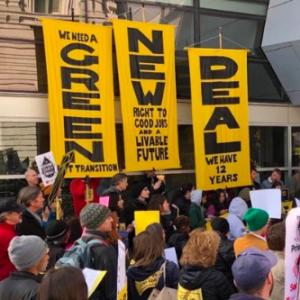As president of the National Ocean Industries Association, it has been my privilege to represent the women and men of the offshore energy industry for nearly a decade. As I leave NOIA, these hardworking and dedicated women and men inspire me and I am confident that any one of them would tell you that America’s energy outlook remains bright. They would also tell you that an all-inclusive energy policy, a true alternative to the Green New Deal, holds the key to unlocking safe and sustainable energy development.
The Green New Deal has seemingly been ever-present during the presidential primary coverage. If you are a Democratic candidate, you will likely endure public shaming until you ally yourself to the Green New Deal. Most recently, former vice president Joe Biden joined senators Elizabeth Warren and Bernie Sanders in embracing the Green New Deal, albeit his own version of the deal.
While there are slight differences in the various Green New Deal versions, they all share crippling costs for Americans. Green New Deal “originalist” Representative Alexandria Ocasio-Cortez has said a true Green New Deal would cost $10 trillion. Beyond the immediate fiscal costs of the Green New Deal, each pledge has also called for the elimination of oil and natural gas leasing on federal lands and waters — a devastating outlook for our nation. Today, 18 of the 22 Democratic candidates support banning new oil and natural gas leasing on federal lands or waters.
Millions of Americans risk being left in the dark, figuratively and literally, under a progressive energy regime. Look at two of the more progressive states: California and Massachusetts. California has pushed to keep its abundant offshore oil and gas resources off-limits, while anti-pipeline attitudes have limited Massachusetts’ access to Marcellus shale production. Today, surging Saudi Arabian oil imports in California and imports of Russian LNG in Massachusetts illustrate where progressive energy policies lead.
Outside of the Green New Deal, other progressive policies are not much better. A discussion draft of new legislation establishes criminal and civil penalties and compensatory mitigation for incidental take under the Migratory Bird Treaty Act. Incidental take means injury or death to a migratory bird, regardless of whether there was intent. The most frequent violators are neighborhood cats, which kill 2.5 billion birds per year. The bill would needlessly complicate and possibly render cost prohibitive all types of critical projects, including offshore wind projects.
The same politicians who are advocating for a “renewables only” energy strategy are willing to risk the ascendant U.S. offshore wind industry and the 18 GW of electricity it could produce by 2030.
An all-of-the-above energy strategy — which includes offshore oil and natural gas and wind — can safely provide energy security and economic growth produced with American values. But we at least need a better seat at the table.
Countries like Brazil and Mexico are attracting billions of dollars of investments for new offshore projects while the governments of Nova Scotia and Newfoundland and Labrador are active partners in offshore exploration and development. Rising global energy demand means the world is not going to wait while the U.S. remains frozen on energy policies.
Ninety-four percent of the U.S. outer continental shelf remains closed for oil and natural gas exploration and production. And U.S. offshore wind producers cannot plan future investments due to the lack of a visible pipeline of new offshore wind lease sales.
Thankfully, there is an American energy solution, and it involves tapping our own offshore resources. Increased access for offshore oil and natural gas production could spur nearly 745,000 jobs and $592 billion in new capital investment and spending within 20 years of initial leasing. Offshore wind could support 160,000 jobs by 2050 and $68 billion in capital expenditures by 2030. The offshore energy industry has the expertise and know-how to deliver real energy results.
It is time for a real deal, not the Green New Deal.

